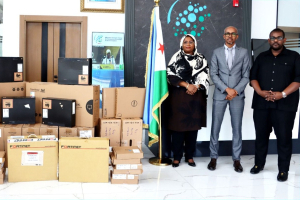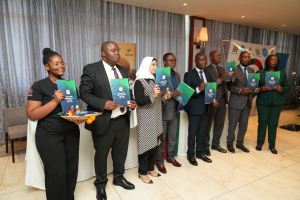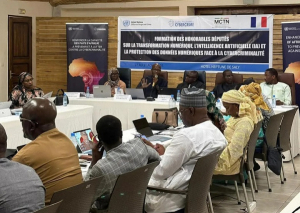Guinea Upgrades Cybercrime Directorate to Secure Digital Transformation
-
Guinea completed the rehabilitation and equipping of its cybercrime directorate, financed by the National Development Budget.
-
Authorities upgraded facilities and equipment to support digital investigations and evidence collection.
-
The country ranked in the third performance tier in the ITU’s 2024 Global Cybersecurity Index, with strong legal and organizational scores.
Guinea continued to strengthen its digital security framework. On January 21, the Prime Minister’s Office announced the full rehabilitation and equipping of the Directorate of Cybercrime and the Fight Against Technological Traces. The National Development Budget financed the initiative.
Prime Minister Amadou Oury Bah visited the new premises alongside the Minister of Security and Civil Protection, General Bachir Dial.
The infrastructure is located in the Minière district in Dixinn municipality. The facility includes a modern two-storey building designed to meet technical requirements for digital investigations. Authorities officially inaugurated the site on December 17, 2025, and they equipped it with specialized tools to analyze technological traces, collect digital evidence, and process information technology-related offenses.
This modernization comes as cybersecurity holds a strategic role in Guinea’s public policies. The progressive digitalization of administrative services, the expansion of electronic payments, and the growth of digital usage increase risks related to cyberattacks, identity theft, and online fraud. Authorities aim to adapt National Police operational capacities to a rapidly evolving digital environment.
In its Global Cybersecurity Index 2024, the International Telecommunication Union stated that countries must prioritize cybersecurity to fully harness information and communication technology potential. Guinea ranked in the third of five performance categories established by the UN agency.
The country recorded strong results in legal and organizational frameworks, with scores of 16.27 and 14.38 out of 20, but it still faces gaps in technical and operational capacity.
Through this investment, Guinea aims to improve the effectiveness of cybercrime enforcement, enhance training for specialized agents, and strengthen citizen confidence in security services. Over the long term, the framework should secure digital usage, support the country’s digital transformation, and provide a safer environment for economic actors engaged in digital development.
This article was initially published in French by Samira Njoya
Adapted in English by Ange J. A. de BERRY QUENUM
Djibouti Moves Toward Launch of National Cybersecurity Authority
-
Djibouti prepares to operationalize its new National Cybersecurity Authority.
-
The agency receives equipment and a defined mandate to oversee national cyber norms and incident response.
-
The move aligns with the country’s ambition to become a regional tech hub by 2035.
Djibouti plans to bring its newly created National Cybersecurity Authority (ANC) into service as the country pushes to position itself as a regional technology hub by 2035. The International Telecommunication Union (ITU) states that this ambition requires stronger commitments to cybersecurity to unlock the full potential of the digital economy.
Authorities advanced the ANC’s rollout last week during a meeting between senior officials from the Ministry of Digital Economy and the agency’s new director. The session reviewed the progress of ongoing cybersecurity projects, set priority cooperation areas, and organized the delivery of technical equipment.
The government supplies the agency with high-performance computers for incident response, international-standard firewalls and network-security systems, high-capacity servers for sensitive data, monitoring screens for security operations centers, and professional cybersecurity licenses. These tools aim to equip the ANC to oversee and enforce national cyber-defense measures.
The legislation establishing the ANC, which lawmakers examined on November 10, gives the agency responsibility for setting national cybersecurity norms and protection procedures for critical sectors. The law also mandates the creation of a national cyber-incident monitoring and response center, expanded international cooperation against cybercrime, and training and awareness programs for public and private actors.
This institutional buildup forms part of Djibouti’s broader push to secure its digital infrastructure as its digital transformation accelerates. The country has already adopted a National Cybersecurity Strategy and a Digital Code and hosts an annual National Cybersecurity Week. In October 2025 in Hanoi, Djibouti signed the UN Cybercrime Convention, joining 21 African nations among 71 global signatories. The country had previously ratified the African Union’s Malabo Convention on cybersecurity and data protection in November 2023.
Despite these steps, Djibouti remains in the second-to-last tier of the ITU Global Cybersecurity Index, posting 11.84 out of 20 in the legislative pillar. The ITU argues that Djibouti must increase efforts in organizational, technical and capacity-building domains, as well as in international cooperation, to close the gap with regional peers.
This article was initially published in French by Isaac K. Kassouwi
Adapted in English by Ange Jason Quenum
Zambia Unveils National Strategy to Protect Young Internet Users
- Government launches a 2025–2029 national child online protection strategy with a $1.8 million budget.
- UNICEF and GSMA created the Africa Taskforce on Child Online Protection in October 2025 to harmonize continental standards.
- Zambia joins Nigeria and Ghana, which already adopted national policies on child cybersecurity.
Zambia has introduced a national strategy to protect children online as digital adoption accelerates amo
ng the country’s youth. The government aims to ensure safer and more responsible Internet access for minors.
The government launched the National Child Online Protection Strategy (2025–2029) on Monday, November 24. The document sets a roadmap to strengthen digital safety for children nationwide and to build a safer online environment for young users.
The government allocated $1.8 million to this plan. The strategy focuses on several pillars, including strengthened national policy coordination, development of digital skills, awareness programs for children and parents, and a structured collaboration framework connecting public, private and civil society stakeholders.
This initiative comes as Internet penetration grows quickly across Africa, especially among younger populations. UNICEF reports that African children rank among the fastest-growing digital user groups worldwide, which increases their exposure to cyberbullying, misinformation, online exploitation and harmful content.
These risks prompted UNICEF and GSMA in October 2025 to launch the Africa Taskforce on Child Online Protection (COP). The platform aims to harmonize protection efforts, deepen cooperation among states and promote shared digital safety standards across the continent.
In Zambia, recent national data on children’s Internet use remains limited. Authorities, however, recognize a steady rise in youth connectivity, which makes preventive, educational and regulatory measures urgent.
With this strategy, Zambia joins other African countries that have already implemented structured national child online safety policies. Nigeria and Ghana in recent years adopted legal frameworks and government programs dedicated to child cybersecurity.
If fully implemented, Zambia’s strategy could reduce minors’ exposure to digital risks and strengthen trust among families and schools in the use of online tools. Its success, however, will also depend on the development of an adapted legislative framework to ensure a safe, inclusive and protective digital environment for children.
Samira Njoya
JA Africa and Google Partner to Train 250,000 Children in Online Safety by 2027
-
Google.org will provide $1.5 million to fund a digital literacy and online-safety programme across four African countries.
-
JA Africa aims to train 250,000 children, 6,000 teachers and 8,000 parents and caregivers by 2027.
-
The programme will deploy Google’s “Be Internet Awesome” curriculum, including Interland, through schools and community networks.
Children in Africa gain access to digital technology at increasingly early ages as connectivity expands across the continent. This rapid exposure, however, brings major risks such as cyberbullying, harassment and exploitation, which compel governments and organisations to strengthen online-safety protections.
JA Africa, the regional arm of one of the world’s oldest youth-focused economic-education organisations, announced on 26 November the launch of a digital-literacy and online-safety programme in Ghana, Kenya, Nigeria and South Africa. The initiative uses $1.5 million in funding from Google.org, the philanthropic arm of Google, and targets the training of 250,000 children, 6,000 teachers and 8,000 parents and caregivers by 2027 to reinforce child safety in a fast-growing digital ecosystem.
“Digital connectivity now forms the backbone of modern life in Africa, and our children must be equipped not only to participate but also to stay protected,” JA Africa CEO Simi Nwogugu said. “With support from Google.org, we help young people turn access into opportunity by building a generation of smart, safe and respectful digital citizens.”
The programme relies on Google’s “Be Internet Awesome” curriculum, which teaches digital security, privacy protection, anti-cyberbullying practices and responsible online citizenship. The curriculum uses Interland, a game-based platform, to engage young learners. JA Africa will deploy the programme through school workshops, teacher-training sessions and community-based activities, including in underserved rural areas. The initiative aligns with existing national frameworks on child protection and ICT-in-education policies in Ghana, Nigeria and Kenya.
The launch comes as minors face rising digital-exposure risks across Africa. GSMA data shows that 18% of children aged 5 to 7 in sub-Saharan Africa already use mobile Internet. The International Telecommunication Union estimates that one child connects to the Internet every half-second worldwide, highlighting the accelerating pace of early digital access. Yet, in 2024, only 39 African countries had completed a national online-child-protection strategy, while 32% were still drafting one and 41% had taken no formal steps.
The project could ultimately support the creation of common continental standards for online child protection through planned collaboration with education, ICT and communications ministries. JA Africa and Google intend to amplify the programme with awareness campaigns, digital-content production and key events, including Safer Internet Day 2026, to broaden public reach.
This article was initially published in French by Samira Njoya
Adapted in English by Ange Jason Quenum
Guinean Graduate Mamadou Alpha Baldé Lands Tech Job After Cybersecurity Certification
-
Orange Digital Center partnered with Coursera in April 2024 to offer free digital training to young Africans.
-
Mamadou Alpha Baldé secured his first job immediately after earning his cybersecurity certification in August 2025.
-
He plans to become a tech entrepreneur and develop his own systems.
Orange Digital Center announced a partnership with Coursera in April 2024 to provide free digital training to young Africans. This initiative aims to accelerate access to high-value technology skills. Mamadou Alpha Baldé, a Guinean student, belongs to the first cohort that secured employment as soon as they completed their certification.
Baldé currently works as a technical sales engineering assistant at the IT firm Hestia SARL in Conakry. He develops software and supports commercial engineering operations. He attributes this position to the strategic diversification of his skills.
He initially trained in mobile and web development at Gamal Abdel Nasser University of Conakry. However, he says his cybersecurity certification, completed in August 2025, opened the door to a more stimulating professional environment due to the scale of the projects involved.
Before earning the certification, Baldé had no professional experience. Seeking to learn and improve his financial prospects, he joined Orange Digital Center while waiting for his bachelor’s degree ceremony scheduled for December 2025. He enrolled in the six-month "Google Cybersecurity Track", created under the April 2024 cooperation agreement between Orange Digital Center and Coursera. He discovered the opportunity on ODC’s Facebook page.
“My learning experience was very enriching. The content was well structured and easy to follow, the Coursera platform was intuitive and pleasant to use. I also appreciated the support and exchanges with the community, which helped me better understand key concepts and deepen my knowledge in cybersecurity,” he told We Are Tech.
During the program, Baldé discovered cloud security and web security, competencies he now applies in all his professional and personal projects. “I personally handle the security of all my servers using the tools studied during the program. If someone enters my system, I receive alerts by email and SMS. That is what I learned in the training.”
Although a partner company introduced him to Hestia SARL, he insists his academic background, certification and completed projects secured the job. “When I came in, I introduced myself, showed my certificates and my projects. They hired me the same day, right after the presentation.”
Baldé says the cybersecurity field fascinates him and motivates him to continue learning. He also expresses a clear long-term ambition: “to become an entrepreneur and create my own systems.”
This article was initially published in French by Melchior Koba
Adapted in English by Ange Jason Quenum
Mozambique, Togo Sign Memorandum on Cybersecurity Cooperation
- Mozambique and Togo signed a cybersecurity cooperation MoU covering CSIRT capacity building, threat information-sharing and regional cyber-resilience.
- The move aligns with a continent-wide rise in cyber threats, with Interpol estimating over $3 billion in losses in Africa between 2019 and 2024.
- Both countries recently joined the UN Convention on Cybercrime, among 21 African signatories.
African governments continue to intensify their cybersecurity efforts, which the International Telecommunication Union (ITU) considers essential to the success of national digital-transformation strategies.
Mozambique and Togo agreed to strengthen bilateral cooperation on cybersecurity and digital resilience. The two countries signed a memorandum of understanding on 17 November during the opening of the first Mozambique International Cybersecurity Week Conference in Maputo.
The document sets four priority areas: enhancing the technical and operational capacities of both national CSIRTs; sharing information on emerging threats and vulnerabilities; promoting exchanges of knowledge, experience and best practices; and contributing to the cyber-resilience of Mozambique, Togo and the broader African region.
Lourino Chemane, chairman of Mozambique’s National ICT Institute (INTIC), said: “The signing of this agreement reinforces Mozambique’s commitment to collaborate with other African countries to ensure a safer, more reliable and more inclusive cyberspace.” He added that in a global environment marked by increasingly complex and interconnected threats, CSIRT collaboration and information-sharing remain essential for effective and coordinated action.
The partnership comes as African countries show growing interest in cybersecurity. It coincides with accelerated ICT adoption and broader digital-transformation efforts, which have been accompanied by a rise in cybercrime. Mozambique and Togo were among the 21 African countries that signed the UN Convention on Cybercrime in late October in Hanoi, Vietnam. Interpol estimates that cyber incidents caused more than $3 billion in financial losses across Africa between 2019 and 2024.
In this context, the ITU urges countries to invest significantly in cybersecurity to fully benefit from the opportunities offered by ICT.
According to the Global Cybersecurity Index, Togo ranks in Tier 2, just below global benchmark countries. The West African state performs strongly in regulation, cooperation, organisational measures and capacity development but still needs to reinforce its technical measures.
Mozambique ranks in Tier 3, with room for improvement in legal, technical and capacity-development measures. The country nevertheless shows solid performance in organisational measures and cooperation.
This article was initially published in French by Isaac K. Kassouwi
Adapted in English by Ange Jason Quenum
Gates Foundation Commits Over $10 Million to Senegal’s Tech New Deal
- The Gates Foundation pledged more than $10 million to support Senegal’s New Deal technologique, its national digital strategy launched in February 2025.
- The partnership will fund a universal digital ID, an AI hub for health and agriculture, and a Delivery Unit to oversee project transparency and efficiency.
- Senegal’s digital strategy requires $2 billion, of which $155 million still needs to be secured.
Senegal signed a $10 million-plus partnership with the Gates Foundation on September 24 to accelerate its national digital strategy, known as the New Deal technologique. The agreement was finalized on the sidelines of the 80th United Nations General Assembly in New York, the state broadcaster RTS reported.
Le Président a reçu en audience M. @BillGates, Président de la Gates Foundation.
— Présidence Sénégal (@PR_Senegal) September 24, 2025
Cette rencontre a permis de conclure un partenariat stratégique de plus de 10 millions de dollars pour accélérer le #NewDealTechnologique et faire du Sénégal un hub africain d’innovation numérique. pic.twitter.com/kBJk37Sigr
The program, launched in February 2025 by President Bassirou Diomaye Faye, aims to transform public services, strengthen digital sovereignty, and establish Senegal as a regional technology hub by 2034.
The deal provides for the rollout of a universal digital identity system, the creation of an artificial intelligence hub focused on health and agriculture, and the establishment of a Delivery Unit to ensure project transparency and efficiency.
The partnership follows an initial meeting between Bill Gates and President Faye during the 79th UN General Assembly, when both sides agreed to expand cooperation in areas including AI-assisted agriculture, sanitation, and digital innovation across strategic sectors.
Senegal budgeted CFA1,105 billion (about $2 billion) for the New Deal technologique. Authorities have already identified CFA950 billion, leaving CFA155 billion still to be mobilized.
Officials expect the Gates Foundation’s contribution to accelerate the implementation of priority projects, expand inclusive digital services for citizens, and attract additional private investment into Senegal’s tech ecosystem.
This article was initially published in French by Samira Njoya
Adapted in English by Ange Jason Quenum
Deloitte Launches CyberAcademy in Morocco to Address Africa's Skill Gap
-
Deloitte launched its CyberAcademy in Casablanca on September 19, 2025, to train cybersecurity professionals across Africa.
-
The academy offers over 60 certified training programs, integrating AI and aligning with international certifications.
-
The initiative supports the Deloitte Morocco Cyber Center's goal of expanding its expert team to over 450 by 2025 and leverages Morocco's Tier 1 global cybersecurity ranking.
Africa faces a significant challenge with the scarcity of specialized cybersecurity skills amid escalating cyber threats. Training represents a critical priority for building a resilient and secure digital ecosystem across the continent.
Deloitte, a global audit, consulting, and technology services firm, inaugurated its CyberAcademy in Casablanca on September 19. The academy operates under the umbrella of the Deloitte Morocco Cyber Center. This specialized cybersecurity training center targets professionals, students, recent graduates, and individuals undergoing professional retraining. Companies currently struggle to recruit qualified talent in the sector.
The CyberAcademy offers more than 60 certified training courses. These programs cover technical, organizational, regulatory, and strategic aspects of cybersecurity. Some modules already incorporate artificial intelligence, and customizable programs adapt to specific business needs. The academy leverages recognized academic partnerships and international certifications (ISC², ISACA, PECB, etc.) to ensure the quality of its curriculum.
This launch aligns with the ongoing momentum of the Deloitte Morocco Cyber Center, which first opened in February 2023. The center currently employs approximately 100 Moroccan and African engineers, with women constituting about 50% of the workforce. It aims to reach over 450 experts by 2025. Furthermore, Morocco has advanced in global cybersecurity rankings. The Global Cybersecurity Index 2024, published by the ITU, assigned Morocco a score of 97.5 out of 100, placing it among the international reference countries (Tier 1).
Deloitte intends to address a proven skills deficit with this academy. Many companies and institutions find it challenging to recruit advanced cybersecurity profiles. This difficulty stems from the proliferation of cyberattacks, digital fraud threats, and heightened regulatory requirements. The country's accelerated digital transformation also drives this need, evidenced by high internet penetration, widespread use of online services, and increasing digitization of public services.
This article was initially published in French by Samira Njoya
Adapted in English by Ange Jason Quenum
Togolese Cybersecurity Expert Radia Ouro-Gbele Aims to Build Africa’s “Cyber Silicon Valley”
• Togolese expert Radia Ouro-Gbele leads Paris-based OG IT Consulting with operations in Africa.
• Her firm trained 500+ young Africans in cybersecurity for global companies.
• She aims to make Africa a global cybersecurity hub within 15 years.
Radia Ouro-Gbele, a Togolese cybersecurity specialist, has built her career working with global companies in energy, nuclear and industrial sectors, designing identity and access management (IAM & PAM) systems and leading large-scale cybersecurity projects.
She is the founder and president of OG IT Consulting, a Paris-based cybersecurity advisory and integration firm launched in 2021 with operations across Africa. The firm provides audits, identity and privileged access management services, as well as executive training. It also runs awareness and skills-building programs, training more than 500 young Africans who have since joined international firms.
Ouro-Gbele told We Are Tech Africa that the venture stemmed from a desire to protect the continent’s digital assets after hearing the struggles of an African executive. Her mission, she said, is to “protect Africa, by Africans and for Africans” through local structures and workforce development.
She has set a long-term target of making Africa a global hub for cybersecurity expertise within 10 to 15 years, envisioning a “cyber Silicon Valley” capable of securing organizations in North America, Europe, Asia and the Middle East.
Ouro-Gbele holds a telecommunications diploma from the École supérieure multinationale des télécommunications (ESMT) in Dakar, and a master’s degree in information systems security from the Université de technologie de Troyes in France. Her career began at Togocom in 2013, followed by a stint at ASECNA in Senegal. She later joined Accenture France as a cybersecurity consultant and worked as a cybersecurity project manager at Thales from 2021 to 2023.
This article was initially published in French by Melchior Koba
Adapted in English by Ange Jason Quenum
Senegal Trains Lawmakers in Digital Transformation
- Senegal launches 'New Deal Technologique' to digitize public services, including parliamentary operations.
- Lawmakers receive training in AI, cybersecurity; electronic voting system adopted for real-time suffrage.
- Despite progress, African parliaments lag in digital maturity, highlighting need for continued investment.
Senegal is accelerating its national digital transformation strategy, dubbed the "New Deal Technologique," launched in February. This initiative aims to enhance the efficiency of public services through widespread digitization, with a particular focus on the legislative branch.
In a collaborative effort, the Senegalese government, the National Assembly, and the United Nations Office on Drugs and Crime (UNODC) recently concluded a five-day digital training workshop for members of parliament. This program is part of broader actions designed to fast-track the digital evolution of the parliamentary institution.
The strategic workshop focused on equipping lawmakers with essential skills in digital transformation, artificial intelligence (AI), personal data protection, and cybersecurity. The objective is to empower them to guide the nation towards digital sovereignty by crafting public policies and legislation that address contemporary challenges, aligning with the "New Deal Technologique" framework.
Significant strides have already been made. In December 2024, the National Assembly implemented an electronic voting system, featuring a platform capable of recording votes in real-time. El Malick Ndiaye, President of the National Assembly, has prioritized the digitization of parliamentary services. The modernization plan also includes the development of an interactive institutional website for b
oth deputies and citizens, alongside the launch of a parliamentary television channel. A dedicated project team has been established to oversee this transformation.
Further demonstrating this commitment, President Ndiaye met with a delegation including executives from the technology company Airudi in May to explore potential collaborations in AI, digital transformation, and professional training. These efforts unfold within a context of profound technological shifts in parliaments globally, driven by demands for greater efficiency, transparency, and citizen participation, as highlighted by the Inter-Parliamentary Union (IPU) in its 2024 World e-Parliament Report.
"Traditional siloed systems are giving way to more integrated and intelligent cloud-based solutions. AI, machine learning, and natural language processing are revolutionizing everything from document management to cybersecurity. These technologies enable parliaments to automate routine tasks, better analyze data, and offer more responsive services to parliamentarians, staff, and citizens," the IPU report, published in October 2024, states.
However, the digital transformation process within the Senegalese Parliament remains in its nascent stages. According to the IPU, the most digitally advanced African parliaments include South Africa, Zimbabwe, Burundi, Morocco, and Mauritius, followed by Tunisia and Malawi. The report indicates that Sub-Saharan Africa remains largely underrepresented among top-performing parliaments, with 50% of its institutions ranked among the 30 least advanced in terms of digital maturity.
This disparity is primarily attributed to a lack of modernization initiatives, insufficient investment in digital systems, and the absence of ambitious digital transformation programs.
This article was initially published in French by Isaac K. Kassouwi
Adapted in English by Ange Jason Quenum











